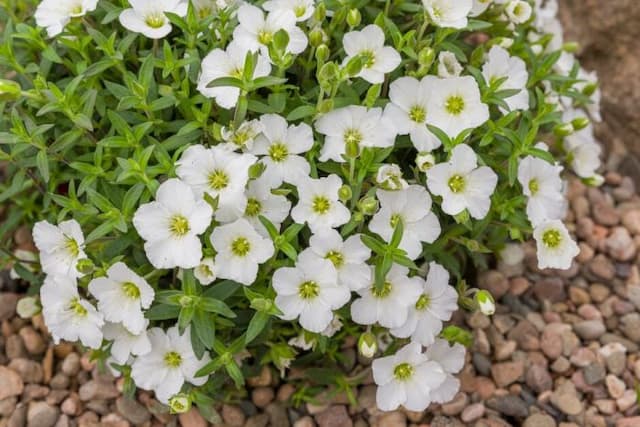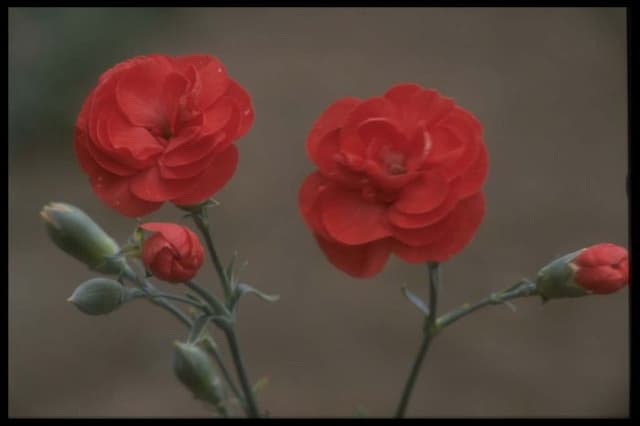Carnation Dianthus 'Devon Carla' (p)

ABOUT
Dianthus 'Devon Carla' is a captivating plant adorned with striking flowers that can instantly grab attention in any garden setting. The bloom is distinct, boasting a frilled edge that gives it a wonderfully intricate appearance. Its petals feature a blend of two colors, with a beautiful base color that can range from pale to more intense pink, and this is set off by a contrasting eye-catching pattern in the center, which usually presents in a deeper shade of red or burgundy. The leaves of Devon Carla are slender and blue-green in color, forming a tidy, low mound that serves as a perfect backdrop for the vibrant flowers perched atop thin, sturdy stems. The overall form of the plant is neat and compact, with a cushion-like shape that adds structure and interest to garden spaces. Moreover, the blooms exude a subtle, sweet fragrance that can be described as clove-like, adding yet another layer of sensory delight to this plant's presence in the landscape. Dianthus 'Devon Carla' is often selected for its profuse flowering and its propensity to re-bloom, continually bringing color and life to the environment throughout its blooming season.
About this plant
 Names
NamesFamily
Caryophyllaceae
Synonyms
Pink, Carnation, Sweet William
Common names
Dianthus 'Devon Carla' (p)
 Toxicity
ToxicityTo humans
Dianthus 'Devon Carla', commonly known as Carnation, is not considered highly toxic to humans. However, ingestion of parts of this plant may cause mild gastrointestinal upset or skin irritation in sensitive individuals. Reactions can include nausea, diarrhea, vomiting, or a rash if there is contact dermatitis. It is usually not severe, but it's advisable to avoid ingesting parts of this plant or handling it excessively if you have sensitive skin.
To pets
Carnations are considered to be mildly toxic to pets. If a pet ingests carnations, they might experience mild gastrointestinal upset, which could include symptoms such as vomiting or diarrhea. The toxicity level is generally low, but it remains prudent to prevent your pets from consuming the plant to avoid these potential consequences.
 Characteristics
CharacteristicsLife cycle
Perennials
Foliage type
Evergreen
Color of leaves
Blue-green
Flower color
Pink
Height
1 foot 6 inches (45 cm)
Spread
1 foot (30 cm)
Plant type
Herb
Hardiness zones
5
Native area
Europe
Benefits
 General Benefits
General Benefits- Visual Appeal: Dianthus 'Devon Carla', commonly known as Carnation, boasts beautiful, vibrant flowers which enhance the aesthetics of gardens and landscapes.
- Aromatic Fragrance: The blooms produce a delightful scent that can add a pleasant aroma to outdoor spaces and cut flower arrangements.
- Long Blooming Period: Carnations often have a lengthy flowering season, providing color and interest in the garden for an extended time.
- Attracts Pollinators: The flowers can attract beneficial insects like bees and butterflies, which are important for pollination.
- Easy to Grow: Carnations are generally easy to care for, making them suitable for gardeners of all skill levels.
- Drought Tolerance: Once established, they can tolerate periods of dryness, reducing the need for frequent watering.
- Cut Flowers: Carnations are popular in floral arrangements and can last a long time after being cut, often staying fresh for up to two weeks.
- Versatility: Ideal for use in borders, containers, and as ground cover, increasing their utility in various garden designs.
- Low Maintenance: They require minimal upkeep beyond the occasional watering, deadheading, and seasonal fertilization.
 Medical Properties
Medical PropertiesThis plant is not used for medical purposes.
 Air-purifying Qualities
Air-purifying QualitiesThis plant is not specifically known for air purifying qualities.
 Other Uses
Other Uses- Addition to Potpourri: The petals of the Dianthus 'Devon Carla', commonly known as Carnation, can be dried and added to potpourri mixtures for a lasting fragrance.
- Bookmark Embellishment: Dried Carnation flowers can be used to decorate or create unique bookmarks, giving them a decorative and personal touch.
- Flower Arranging Classes: Carnations are an excellent teaching tool in flower arranging classes due to their sturdy stems and vibrant colors, helping students to learn various techniques.
- Color Dyes: The vibrant petals of Carnations can be used to create natural dyes for fabrics or paper crafts.
- Bath Bombs: Dried Carnation petals can be incorporated into homemade bath bombs to add color, texture, and a mild fragrance.
- Flavoring for Sweets: The edible flowers of Carnations can be used to infuse sugar or syrups, imparting a subtle flavor to desserts and sweets.
- Handmade Paper: Carnation petals can be added to the pulp in the process of making handmade paper, resulting in beautifully textured and colored paper sheets.
- Ice Cube Ornamentation: Frozen Carnation petals within ice cubes can make a decorative statement in punches or cocktails at special events.
- Candle Making: Pressed or dried Carnation petals can be embedded into homemade candles for an aesthetic appeal.
- Herbal Sachets: Carnation petals, known for their fragrance, can be used in herbal sachets to scent drawers and closets.
Interesting Facts
 Feng Shui
Feng ShuiThe plant Carnation is not used in Feng Shui practice.
 Zodiac Sign Compitability
Zodiac Sign CompitabilityThe plant Carnation is not used in astrology practice.
 Plant Symbolism
Plant Symbolism- Romantic Love: The Dianthus flower is often associated with love and romantic sentiments, partly due to its lovely fragrance and enduring beauty, representing deep affection and passion.
- Admiration: Gifting someone Dianthus suggests admiration and can be a way to express the high regard one holds for another.
- Boldness: Its vibrant colors symbolize boldness and daring, making it a perfect flower to encourage someone to take a leap of faith or to celebrate their fearless attitude.
- Divine Favor: In historical contexts, Dianthus has been linked to the divine. Its Greek name is derived from "dios" (divine) and "anthos" (flower), which can symbolize the idea of heavenly blessings.
- Protection: Some traditions hold the Dianthus plant in a protective light, believing it can ward off evil spirits or negativity, offering safeguarding properties.
 Water
WaterCarnations, including Dianthus 'Devon Carla', prefer evenly moist soil and should be watered thoroughly whenever the top inch of soil feels dry to the touch. Water the plants early in the day to allow foliage to dry out, which helps prevent disease. Typically, this would be about once a week, but it can vary depending on climate and weather conditions. When watering, aim for about one to two gallons per square foot every week during active growing periods, adjusting based on rainfall and temperature.
 Light
LightCarnations thrive in full sunlight and will perform best when they receive at least six hours of direct sunlight each day. They should be planted in a spot that is exposed to full sun for the majority of the day to encourage healthy growth and abundant flowering.
 Temperature
TemperatureCarnations, such as Dianthus 'Devon Carla', prefer cooler climates and will thrive in temperatures between 60 to 70 degrees Fahrenheit. They can survive temperatures as low as 40 degrees Fahrenheit and as high as 80 degrees Fahrenheit, but prolonged exposure outside of their ideal temperature range can hinder growth and bloom production.
 Pruning
PruningPruning carnations, such as Dianthus 'Devon Carla', is necessary to encourage bushier growth and more blooms. Deadheading, or removing spent flowers, should be done regularly throughout the blooming period to promote continuous flowering. Cut the stems down to the first set of leaves to maintain a tidy appearance. The best time to perform a more substantial pruning is early spring or after the flowering period ends.
 Cleaning
CleaningAs needed
 Soil
SoilCarnations thrive in well-draining, fertile loam with a neutral to slightly alkaline pH between 6.7 and 7.5. A mixture of one-third garden soil, one-third peat, and one-third perlite or sand provides an ideal growing medium for carnations.
 Repotting
RepottingCarnations, typically perennial in nature, don't require frequent repotting. They should be repotted or divided every 3-4 years to rejuvenate the soil and encourage robust growth.
 Humidity & Misting
Humidity & MistingCarnations prefer moderate to low humidity levels. They thrive best with good air circulation around the plants, avoiding overly humid conditions which can promote fungal diseases.
 Suitable locations
Suitable locationsIndoor
Ensure full sun, well-drained soil, and cool temps for indoor Carnations.
Outdoor
Plant in full sun, in well-drained soil; deadhead spent flowers.
Hardiness zone
3-9 USDA
 Life cycle
Life cycleDianthus 'Devon Carla', commonly known as Pinks, begins its life cycle as a seed that germinates in well-drained soil with plenty of sunlight. Upon sprouting, the seedling grows into a young plant with a rosette of narrow, blue-green leaves. As the plant matures, it develops sturdy stems that bear the signature fragrant flowers, usually in shades of pink, red, or white, which typically bloom in late spring to early summer. After pollination, often by bees or butterflies, the flowers will produce small seed pods that, once dried, release seeds for the next generation. In the right conditions, Pinks may also spread through vegetative propagation from existing plant segments. The plant is perennial, which means it can survive through multiple growing seasons, often going dormant in winter and returning in spring.
 Propogation
PropogationPropogation time
Spring-early summer
The Dianthus 'Devon Carla', commonly known as Pink, is frequently propagated through the method of cuttings, particularly during late spring or early summer. To propagate Pinks using cuttings, one would take non-flowering shoots of about 3 to 4 inches long from the parent plant. These cuttings should be stripped gently of the lower leaves and inserted into a mix of equal parts peat and perlite or into a specialized cutting compost. It's vital to ensure that the cutting environment maintains high humidity and a temperature of around 70 degrees Fahrenheit (21 degrees Celsius), typically achieved by covering the cuttings with a plastic dome or propagator lid. The cuttings usually root within two to four weeks, after which they can be transplanted into individual pots to grow on before being moved to their final planting positions.


![Pink [Tequila Sunrise]](/_next/image?url=https%3A%2F%2Fplants-admin.emdemapps.com%2Fimages%2Fplants%2F%2Fimages%2F604b5d995d06e.png&w=640&q=75)






